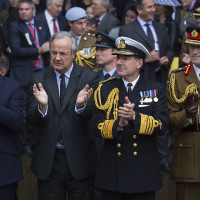Members of the Armed Forces and civilian personnel who worked to tackle Ebola have marched to parliament for a reception in their honour.

The parade for Operation Gritrock saw Soldiers, Sailors and Aircrew joined by volunteers and government workers from the Department for International Development (DFID), NHS England and Public Health England march from Horse Guards Parade down Whitehall to The Houses of Parliament.
Over 1,000 Armed Forces personnel were deployed on the operation, with 27 still in country supporting the ongoing efforts by government workers and NGOs to get to zero cases of Ebola as quickly as possible. In total over 3,000 people from the UK travelled to work in high risk areas to stop the spread of the disease. One year ago the number of cases per week was around 200, which is now down to just a handful.
RFA Argus and her three Merlin helicopters from 820 Naval Air Squadron and detachment of Royal Marines from 1 Assault Group Royal Marines played a vital role, providing much-needed equipment, supplies and food packages to remote areas of Sierra Leone.
Defence Secretary Michael Fallon said: The work being done in Sierra Leone by members of our Armed Forces, Civil Servants and NGOs is remarkable and today offers a public appreciation for what they have done to halt the spread of Ebola.
We remain dedicated to getting the number of Ebola cases down to zero and still have a number of military personnel on Operation in West Africa to assist with this ongoing effort.
The UK has led the international response to the Ebola crisis in Sierra Leone. As part of this the government has committed £427 million to the response so far. This has supported more than half of all the beds available for Ebola patients in Sierra Leone, funded over 100 burial teams, trained 4,000 frontline staff, provided three labs to test one third of all samples collected nationally and delivered over one million PPE suits and 150 vehicles.
International Development Secretary, Justine Greening said: We can all be immensely proud of the contribution the thousands of Brits who deployed to West Africa have made to the fight against Ebola.
Although the fight is not quite over, the extraordinary courage, skill and hard work of over 2000 UK military and civilian personnel, including many from DFID, has made a vital difference to Sierra Leone’s efforts to defeat this terrible disease.
The UK’s top priority remains to help the government of Sierra Leone and the wider region reach and then maintain zero cases of Ebola as quickly as possible. We are proactively seeking out cases and dealing with remaining chains of transmission through enhanced active surveillance, comprehensive contact tracing, as well as strengthened social mobilisation, encouraging the people of Sierra Leone to go to a health centre if symptomatic and to bury the dead in a safe and dignified way.
Health Secretary Jeremy Hunt said: I want to thank our health staff, aid workers and military personnel for their tireless work both at home and abroad during the Ebola crisis. They embody both our national values and the values at the heart of our health service their expertise and dedication is second to none.
Brigadier Steve McMahon said: I had a remarkable team with me in Sierra Leone; brilliant men and women deployed at exceptionally short notice to bring hope to the people of Sierra Leone. The medical piece has been celebrated but the engineering element was also significant. In a very short time period, military personnel cleared six sites of jungle and built the same number of Ebola Treatment Centres, all whilst enduring rising temperatures and humidity.
We are honoured to be invited to march to Westminster today and have our efforts celebrated by Parliamentarians and the public and I’m delighted that everyone from the MOD, alongside our colleagues from DfiD, FCO and UK Health have been recognised for what was a truly exceptional effort by UK personnel.
A number of the military and civilian personnel visited Downing Street in July to be awarded medals in recognition of their efforts. Thousands of people who helped during the crisis on behalf of the UK in West Africa revived the medal such as those from our armed forces, NHS doctors and nurses, laboratory specialists, civil servants and non-governmental organisations, many of whom took part in the parade.










